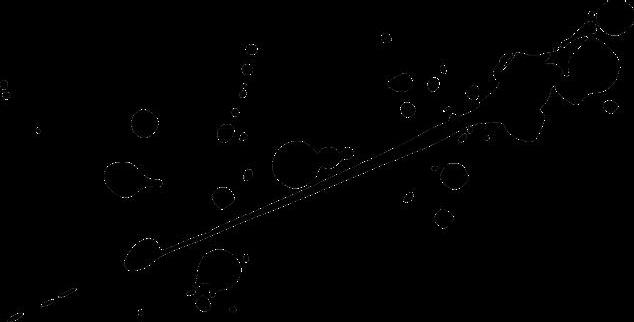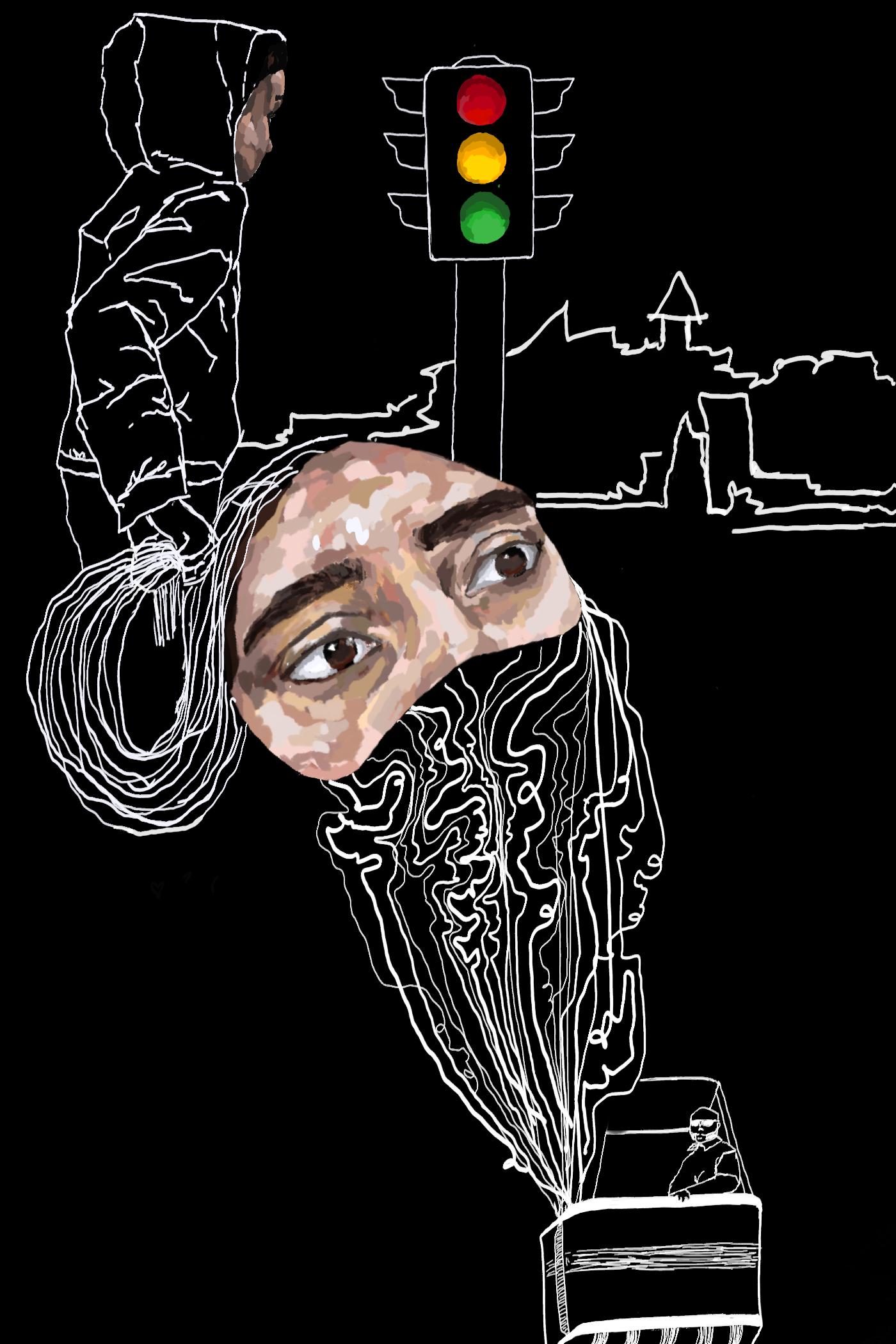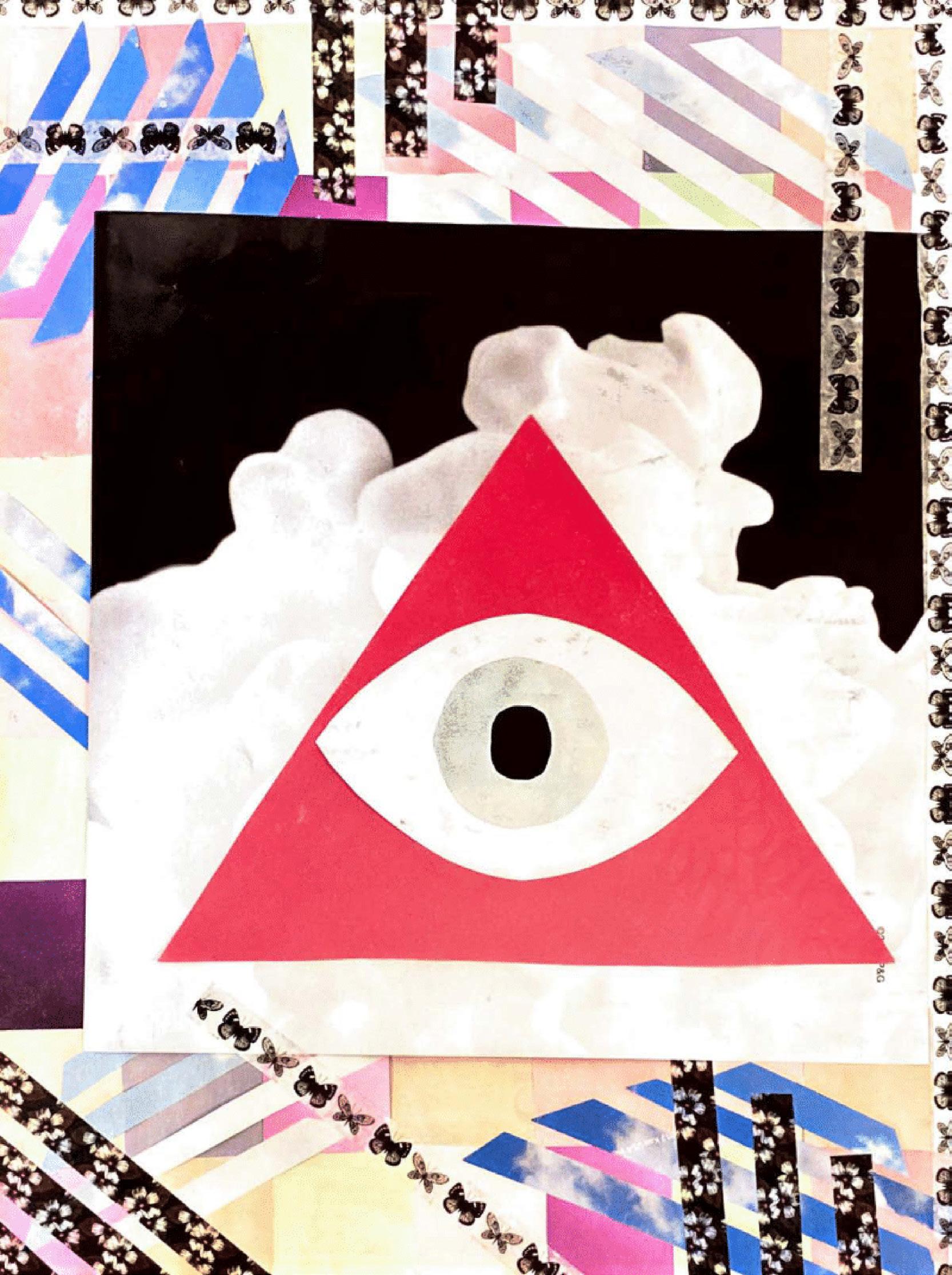
14 minute read
Bhavana KHe murmered
from Volume XII: Onism
by GSMSTLitMag
He Murmured
Bhavana Kunnath, 2021
Advertisement
He sat there.
You son of divine eternity, You son of Dronacharya 1 ,
He sat there on a cold noon in January, letting the crisp air attempt to tousle his hair out of its perfect hibernation. The sun yawned at its zenith and shone down upon him, warming the bench beneath him but doing little to warm the man himself. He scratched his perfect, faded beard, wiped a bit of dust off of his cashmere turtleneck, and let his hand fall down into the wine-colored suede of his suit jacket. He turned his face upwards, attempting to soak in the precious sunlight while he still could, knowing that Surya 2 would not let his rays fall on him for long. a regular here, or anywhere else for that matter. He was somewhat out of place in the harsh lighting of the hipster overhead lamps with his eyes that spoke of poetic tragedy. Though the sophistication—the inexplicable and subtle coldness—with which he moved and spoke suggested that he was infinitely older, he seemed to be about her age. She was beginning to think she knew him somehow, as though the few minutes she spent carefully searching his face while he waited for coffee had been enough for her to decipher something about him. She had developed a certain fondness for the mysterious figure that drifted in at all odd hours of the day, so she did not think much of it when her new regular asked to wait outside on this sunny, albeit bleak, day.
He turned his idle eyes back to the cofBut he was not her regular. He was a fee shop in front of him, fixing his empty vagabond slave to circumstances beyond gaze on the young barista flittering around from one table to another behind the pristine “He was a vagabond slave to circumstances his volition. He smiled stiffly, ruefully, at the glass panes before him and leaned back against the glass walls. He wondered if beyond his volition.” bench. He did not question the she had been put off by his force that compelled him to wait odd request to wait outside until his oroutside that day (he had simply stopped der was ready or if she had forgotten him questioning these forces altogether), but altogether. whatever force it was he was grateful for the opportunity to observe the café in its
She hadn’t forgotten; she couldn’t. He entirety. had been a recurring figure at the shop for a week now and she had begun to The barista was a child in his eyes. She think of him as regular—only he was not knew him no better than the old man
that sat in the window booth waiting for his grandchildren or the businesswoman tapping her pen against the counter impatiently. They were all children to him really: the young lady, the old man, and the woman were all infants in his mind. He had outlived them all by millennia and he’d outlive them by another thousand.
He unconsciously stroked the old, partially scarred-over cut in the center of his forehead .3
He’d outlived them all, and thousands of others just like them, but he never tired of them, of watching, of trying to figure them all out. One moment they were grand puzzle pieces fitting just so into some divine scheme, and the next they were little blips of light sighing out one last twinkling ray before blinking shut; one moment they were sages and sadhus 4 of great wisdom, and the next they were defenseless bundles, empty and eagerly awaiting meaning to fill them; one moment they were nothing more than leaves, and the next they were nothing less than mammoths. And he? He outlived them all.
You thief of wombs ,5 You abuser of the Narayana astra 6 :
When the Pestilence danced its way across the tightly woven continent and the masses fell as feathers do, he was there. The peasants rarely withered softly the way the noblemen did for the peas
ants’ bones, so used to silent toil, finally found horrid expression through the boils in their skin. As father and child writhed in agony and beaked doctors were as one with priests in their whisperings of failing remedies, he watched them let blood senselessly from bodies already dangerously close to atrophy. Following the processions of apothecaries and flagellants, he kneeled silently with the tormented in their prayers as their dead were carted off. The gods that had walked his deserted earth in his long-gone hallowed age had lifted their feet off of these three mortal worlds and with them took their miracles, leaving man with his ignorance. Ignorance and undying hope. Ignorance, undying hope, and illness. When the feudalists, in death, had their first taste of democracy as blackened skin crept upon the arms of the aristocrats and serfs alike, he pulled for them the plows they had left in their common lands and he watched for them their orphans still clinging to feral life.
When Miriam excused herself from the amusements with an ashen face and quivering hand, he was there. She wandered into the seemingly vacant parlor room where the roar of the jazz dulled into a muffled murmur and the glint of groomed eyebrows and golden comet cigarette cases with their tumbling smoke was a distant, fastly dissipating memory. Miriam collapsed in a chair near the fireplace, allowing her body to shudder as a horrible cough racked her ribs. She

caught sight of herself in the mirror; and in less than a minute, a bombardier there was a bruise-like blossom brewing and the bright minds behind him had beneath the rouge on her cheeks, a pale blinded a world accustomed to pristine gale hiding beneath the artificial tint of sunlight and lampshades with chemical her lips. Elizabeth glided in silently, slidbrilliance. He was there with the men ing the door closed behind her and stood above watching, through the glint of inky behind the great armchair with her brows goggles, the great mushroom cloud rising furrowed. Elizabeth had noticed the way above a city that would never be the same Miriam had shivered and shied away from in a world that would know no lesser all of the dancing. She had hoped the fear, and he was there on the ground bechill of the room had just been getting low with the broken puppets in the clinic to Miriam in her slip gown; she had seen who tasted metallic annihilation on the the sanguine dribble secreted away in Miriam’s handkerchief but she hadn’t wanted to believe it was blood; she hadn’t verge of rehabilitation. There were a great many nurses and good samaritans who tried to heal the coughing innocents, “the sacred grounds where divinity once danced were divided and wanted it to be true. Now, subdivided by wandering who could not feel their own seeing the blue spots forming dynasties” cells corroding beneath the on her cheeks, it was evident: barrage of chemical thievthe Spanish flu. Miriam ventured a frail ery, and there were a great many men in hand above her, reaching out towards uniforms who, in that moment, felt their Elizabeth who grasped it desperately, breath sucked away into that awful cloud comfortingly, and leaned down to wrap come up from the earth. When pale, her arms around Miriam as if she could smoky, silent oblivion struck again three warm her heart, as if she could bail the days later, he was there. water out of her lungs. Elizabeth could feel Miriam drowning from the inside When scarlet swirled in the heart of out; she could feel her love melting away his native land, which had been chained in her arms. When Elizabeth pressed her by imperial schemes and greedy foreign warm lips to Miriam’s cool forehead, he tongues after he had exiled himself from was there. it, he was there. The golden empires were buried, and the sacred grounds
When the whir of the planes drowned where divinity once danced were divided out the sounds of civilians and man’s and subdivided by wandering dynasties, foul mechanical arm reached its greatest, strained by brutish British iron. He was darkest height, he was there. The Little a foreigner there amongst the people of Boy hurtled towards unsuspecting earth his blood who had strayed so far, and yet
he bore sins deeper than them all so with them—for them—he raised his arms. The queen of the Sivaganga 7 raised her arms to the sky in battle and in her noble bloodshed a decade of peace reigned, but that decade was not independence. The sepoys 8 purged themselves of the sacrosanct lies and the shaming of their native king with the gunpowder that embedded itself in their commander’s coats, but their war cries were not independence. The Mahatma with his copper head led the multitudes with their thousand-headed gods and in their footfalls were the rumblings of independence. When the hungry and the ignorant with their intricately interwoven hearts gathered at the temple steps and concrete apartment buildings covered hallowed grounds and the anglicized words of globalizers wormed their way into the mouths of the many tongued who were finally, supposedly, free, he was there.

Surrender now the gem-like eye of the Chiranjeevi 9 , Suffer now your bleeding wounds in endless wilderness,
When the sky darkens and that great man of all of the ages, when the hero incarnate approaches on his shining steed 10 , he will be there. He will be there as he was all those thousands of years ago before he was the cursed man he had become. He will be there on that distant yet fast-approaching day as he was on that battlefield long ago: the warrior, the son of the learned, the blessed immortal; he will be there but he will not be the man that he was: the dishonorable commander, the warrior cloaked in night, the vengeful son, and the gutter of wombs. He will be there face to face with a white steed and he will be a different man. Until that day he would suffer his penance.
He shed his golden armor cursed by the divine for woven peasants clothes, he swapped his meager patchwork rags for chainmail, he stripped away his chainmail to adorn a kevlar vest, he cast off his kevlar for modest monk robes—he changed form time and time again but he was always him, and he always outlived them. He threw himself into heated battles without his celestial astras, he bowed down among the diseased, he thrust bare hands into furnaces to shield their children, he let metal pierce his armor, he let water drown his lungs, he held the hands of the contagious, but he always outlived them all. The purpose of his curse eluded him entirely. He was condemned to an eternity in wilderness 11 and yet it seemed that providence—karma—only contented itself with carefully moving him about the Earth as though he was some kind of wretched chess piece forced to move not from square to square but from catastrophe to intimate tragedy covering the whole range of human vagaries. He was told he would suffer a bloodied body for many eons and yet he could not bleed, and his only pains had come from the taunting he suffered, as Sisyphus had, in
Cry for unrelenting death.
“Ash! Ash!”
The barista ran out of the cafe with her ponytail bobbing behind her. She was nearly breathless when she reached him, but she managed to muster up that brilliant smile most service workers have mastered after a few years on the job as she thrust his coffee into his hands. He smiled thankfully as the warmth radiating off of the styrofoam warmed his numb hands.
“Ash, I sure hope you don’t plan on waiting out here every day or I might just collapse before I even get your order to you.”
He laughed cordially as she took a moment to catch her breath, and his laugh brought a smile to her lips.
“I don’t intend to do this every day,” he whispered as she watched her disappear behind the glass door of the cafe once more. The old man’s grandchildren ran in behind her.
His ears tried to hold on to the few notes of the indie music and the snippets of conversation whirling around inside that escaped in the brief interval when the door had been open. He had a feeling

it was not going to last much longer. He had been wandering long enough to have developed a feeling about these things.
Why here? Why did god bring him here? He would find out soon enough and no doubt he was powerless to change it for he was little more than the man condemned to survive it, whatever it was to be. He took a deep gulp of the coffee letting the black liquid burn its way down his throat. Perhaps—
Somewhere within the cafe, a shrill beeping noise rang out.
Perhaps he was cursed not to wander in woods but in the wilderness of man, not to ooze from a thousand physical cuts but to live dying and weeping for the thousand sorrows of man. Perhaps his penance was not to simply suffer his sins but to—
The cafe exploded.
The shards of glass slicing through the still air managed to reach him even where he was all the way across the street and a few even managed to slit his cheek. The patrons within hadn’t had the chance to scream, but of course, they didn’t need it—the shrieking of the metal bent outward unnaturally by the force of the blast would have drowned them out anyway. Thick smoke billowed out in the wake of that warm dream of a building.

There were no survivors.
Salt dripped down from above the coffee cup and mixed with the creme swirling inside.
He used the back of his hand to wipe the blood off of his already healed cheek and gulped down the rest of his coffee with his wavering eyes fixed on the wreckage. The ancient scar on his forehead throbbed. He crumpled the cup between his fingers, inadvertently smearing the “Ash” inscribed in sharpie on its side, and tossed it into the trash.
Ashvatthama walked away.
1.
2. 3.
4. 5.
6.
7.
8.
9. 10.
11. In the Mahabharata, he is the guru of both the Kauravas and Pandavas who educated them in affairs of government, ethics, war (divine weapons included) and spirituality. Some consider him the 3rd incarnation of Brahma. He is manipulated into fighting for the Kauravas despite knowing they are in the wrong . He is killed when he is tricked into believing his son is dead (Ashvatthama hatha kunjara) and prays for his soul on the battlefield. God of the sun. He is born with the gift of a divine gem in his forehead which protects him from fatigue, hunger, and thirst. He is forced to surrender this gem as part of his punishment. A holy man or ascetic. He commits the great sin of attacking a Pandava camp at night (which is against the rules of war) and killing the innocent children of Draupadi thus ending the Pandava line. This is the great celestial weapon of Vishnu that can only be stopped if the target displays total submission to the weapon before it strikes. If it fails the first time and is used again it will turn on the user. He uses this weapon in the Kurukshetra war against the Pandava army who is instructed to surrender by Krishna thus rendering it ineffective. In anger, he redirects it toward the pregnant Uttara who is carrying the last member of the Pandava line but she is protected. He is cursed by Krishna for this attack. Rani Velu Nachiyar was the first Queen to combat British colonizers in India. She was trained in the art of war and a renowned scholar as well as a polyglot. The sepoys were Indian soldiers in the British army who rebelled in 1857 after facing oppressive British reforms, cruelty, and a disregard of their religious principles. Immortal beings who must remain alive until the end of the Kali Yuga (the last age). This is a reference to the last Avatar of Vishnu that is predicted to come at the end of the Kali Yuga (the current Yuga) on a white horse to cleanse the world of sin. As a result of his immoral actions on the battlefield, he is cursed by Krishna to roam for thousands of years with unhealed wounds and cry for death. Because he did not fear death or consequenced during the war he will not receive the mercy of death as a punishment. Some believe him to be alive and wandering the earth today. Some say when his curse is completed he will attain his true spiritual form and join Kalki during the apocalypse.









